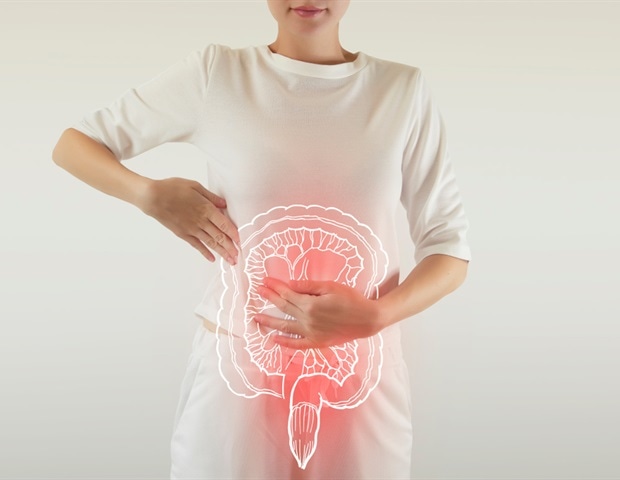
Not everybody responds equally effectively to therapies for inflammatory bowel illness (IBD). What is going to work for particular person sufferers entails trial and error throughout the remedy course of. Now, a workforce of researchers led by Charité – Universitätsmedizin, in collaboration with colleagues in Berlin and Bonn, has succeeded in figuring out a biomarker that signifies whether or not or not remedy with a sure treatment known as an immunomodulator will probably be profitable. Writing within the journal Gastroenterology,* the researchers observe that this may allow extra focused use of the remedy.
Inflammatory bowel illness (IBD) takes a number of kinds, together with Crohn’s illness and ulcerative colitis. It’s attributable to an overactive immune response within the gastrointestinal tract. Folks with the illness expertise stomach cramping, diarrhea, and fatigue. There isn’t a treatment; to date, the one remedy has been to alleviate signs and management irritation. “As a medical scientist, I’m actively concerned in affected person care,” says Prof. Ahmed Hegazy from the Division of Gastroenterology, Infectious Ailments and Rheumatology at Charité. “This illness entails episodes referred to as flares, which are sometimes unpredictable, so the remedy is consistently being adjusted. To date, it has not been potential to foretell the person course of the illness or how sufferers will reply to varied remedy choices, which is what makes remedy so difficult.”
One extremely efficient remedy choice with solely minor uncomfortable side effects is called integrin-blocking remedy. It prevents sure immune cells from getting into the gastrointestinal tract and triggering inflammatory processes there. Vedolizumab, a selected antibody to a selected integrin, has a blocking impact: It binds to T helper cells, protecting them from getting into the gastrointestinal tract. “Integrin-blocking remedy is extremely efficient in about two-thirds of sufferers. However for the opposite third, it would not work in any respect. Beforehand, determining who would reply to the remedy was a matter of trial and error. That’s tedious, time-consuming, and expensive, plus it’s usually fairly irritating for sufferers,” Hegazy says. “It might be useful to have a biomarker that may present prematurely whether or not or not the remedy is promising. That is precisely what we got down to discover with our examine.”
Machine studying helps with sample recognition
The researchers’ in depth research had been based mostly on 47 sufferers with power IBD. Blood samples had been taken earlier than they began remedy with vedolizumab and 6 weeks after initiation of remedy. The researchers used superior analytical strategies comparable to mass cytometry, single-cell RNA sequencing, and serum proteomics to look at the samples. “We zeroed in on completely different sorts of immune cells and sure proteins and seemed for potential modifications attributable to the remedy,” Hegazy explains. “This generated in depth information, which we then analyzed utilizing machine studying. Machine studying is a subject of synthetic intelligence that makes use of algorithms and statistical fashions to permit computer systems to be taught from information and acknowledge patterns with no need to be explicitly programmed prematurely. This allowed us to establish patterns that assist to foretell which sufferers are extra possible to answer this type of remedy.” The interdisciplinary workforce made up of researchers from the fields of drugs, bioinformatics, arithmetic and biology, which additionally included researchers from the Berlin Institute of Well being at Charité (BIH), the German Rheumatism Analysis Centre Berlin (DRFZ), and the College of Bonn, recognized the identical patterns in research of one other group of sufferers. That group of 26 individuals helped the researchers to validate the outcomes of their examine.
Excessive biomarker ranges, low remedy response
One particularly significant molecule was a cell division protein known as Ki67, which is produced at elevated ranges when T helper cells divide. Sufferers with excessive ranges of those cells of their blood previous to remedy didn’t reply to vedolizumab. “We had been ready to determine the molecular phenomenon behind this: These T helper cells do not need binding websites for vedolizumab, so they’re able to cross unimpeded into the gastrointestinal tract and proceed to contribute to irritation,” Hegazy explains. “These cells have completely different trafficking molecules that enable them to maneuver into the gastrointestinal tract. This makes Ki67 a very good indicator of the presence of vedolizumab-resistant T helper cells.”
Transferring into medical apply
The researchers plan to confirm their findings by giant multicenter research and examine the reliability of the biomarker they’ve recognized intimately. Plans additionally name for additional growing their detection and measurement strategies to allow them to be integrated into routine medical apply. “Dependable biomarkers are the important thing to individualized remedy, and thus higher remedy, for our sufferers with power inflammatory bowel illness,” says Prof. Britta Siegmund, the division’s director. As soon as that situation is met, selections relating to the best particular person type of remedy will be made sooner and with better accuracy. And that represents a step towards personalised medication that may deliver readability for sufferers early on.
Supply:
Journal reference:
Horn, V., et al. (2024). Multimodal profiling of peripheral blood identifies proliferating circulating effector CD4+ T cells as predictors for response to integrin α4β7-blocking remedy in inflammatory bowel illness. Gastroenterology. doi.org/10.1053/j.gastro.2024.09.021.

